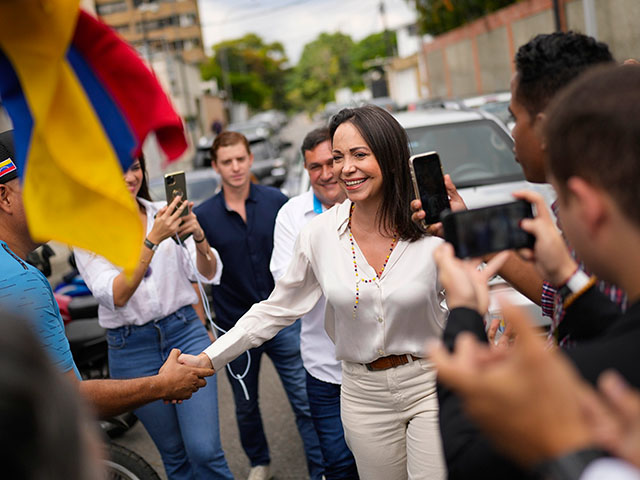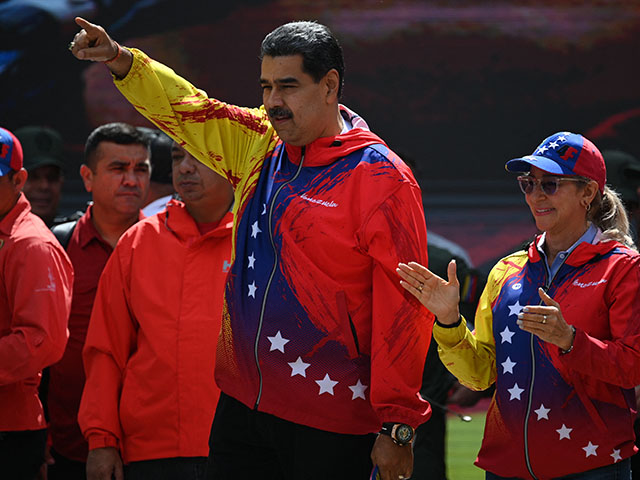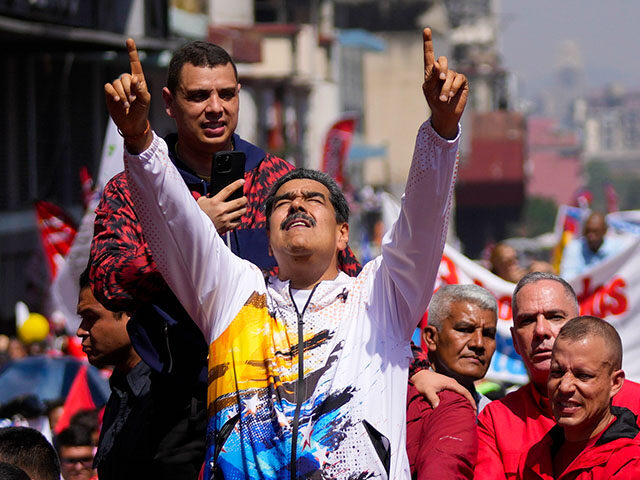Venezuela’s National Electoral Council (CNE) did not allow the Venezuelan Unitary Platform opposition coalition to register the candidacy of Corina Yoris for the upcoming July presidential election.
The Venezuelan Unitary Platform is the only political entity in Venezuela authentically opposing the ruling United Socialist Party of Venezuela (PSUV), led by dictator Nicolás Maduro. Its absence on the ballot means Maduro will run against handpicked rivals who will not challenge his regime or its ideology.
The Unitary Platform announced Yoris, an 80-year-old academic, as its candidate as a substitute for María Corina Machado. Maduro banned Machado from running for any public office, keeping her off the ballot despite her overwhelming victory in the Unitary Platform’s primary.
Machado, who leads Venezuela’s only mainstream center-right party Vente Venezuela, was banned as punishment for her calls to impose international sanctions on the socialist regime over its flagrant human rights violations.

Supporters greet opposition presidential hopeful Maria Corina Machado as she arrives at a polling station to cast her ballot during the opposition primary election in Caracas, Venezuela, Sunday, Oct. 22, 2023. (AP Photo/Matias Delacroix)
In addition to restrictions on her person, a dozen of Machado’s campaign staffers have been arrested and accused of being involved in unproven assassination plots against Maduro.
Venezuela will hold a sham presidential election on July 28. The prospect of having the Maduro regime allow a “free and fair” presidential election in Venezuela was a goal heavily promoted in recent years by the administration of U.S. President Joe Biden and Secretary of State Anthony Blinken.
In October, the Biden administration acted as mediators for the “Barbados Agreements,” a document signed between the Maduro regime and the Unitary Platform that bound the regime to take vague steps towards a “free and fair” election sometime during the second half of 2024. Some of the agreement’s terms included lifting existing bans on politicians such as Machado that prevent them from running for office.
In return for signing the agreements, President Biden awarded the rogue socialist regime with a broad oil and gas sanctions relief package, effectively restoring the authoritarian regime’s main source of revenue.
The Maduro regime never showed any signs of committing to the terms of the Barbados Agreements and, after repeatedly violating the terms of the deal, it completely “replaced” it with a sham agreement signed by the socialist regime with collaborationists. The new agreement did not count with the Unitary Platform’s participation.

Venezuelan President Nicolas Maduro (C) and First Lady Cilia Flores (R) greet supporters during a rally in Caracas on February 29, 2024. (FEDERICO PARRA/AFP via Getty Images)
The Maduro regime, shortly after having its oil and gas sanctions lifted, initiated a violent dissident crackdown known as “Bolivarian Fury” that has led to the arrest of several opponents of the regime, who now stand accused of allegedly plotting to assassinate Maduro.
As part of the new sham electoral agreement, the nation’s top electoral authority — entirely under the control of the ruling socialists — provided all political parties and prospective candidates with a very strict March 21-25 timeframe to register their corresponding applications. The Venezuelan Unitary Platform opposition coalition denounced the CNE for not granting it access to the systems that would have allowed it to register Yoris as a candidate this weekend and on Monday.
All candidacies must be registered on a special CNE website that can only be accessed by political parties using credentials the CNE provides. The CNE also blocked Yoris from registering as an independent, as the agency only allows candidates to sign up if they are representing a regime-approved political party.
“Nicolás Maduro did not allow the nomination of the unitary candidacy,” the Unitary Platform announced late Monday evening in a message posted to social media. “We were never allowed access to the application system!”
“Since the same day, Thursday the 21st at 6 am, we have systematically tried to access the system and it was not possible,” the message continued. “We demand that the deadline to apply, which is our right, be restored!”
The message was published minutes before CNE’s Monday, March 25, 11:59 p.m. deadline. The Unitary Platform’s general secretary Omar Barboza described CNE’s actions as a “historic trampling” on early Tuesday, right after the deadline passed.
Although CNE did not allow Yoris to run as Machado’s substitute, the electoral authority did allow several “opposition” regime collaborationists to register their candidacies in the five days. It also allowed “opposition” candidate Manuel Rosales of the leftist A New Era party to register minutes before the time was up. A New Era is a formal member of the Socialist International.
Rosales, who unsuccessfully ran against late dictator Hugo Chávez in 2006, did not participate in the opposition’s October 2023 primary election, where Machado obtained an overwhelming 93 percent of the votes.
A career politician from the northwestern state of Zulia, Rosales has served as its governor since 2021, a position he previously held between 2000 and 2008. Rosales has been accused of brokering deals with the ruling Maduro regime in the past, as he had fled Venezuela in 2009 after the socialist regime accused him of illicit enrichment. He returned to Venezuela in October 2015 after living in exile in Peru, where he was arrested. The Maduro regime released him in 2017 and lifted a ban on him holding public office that same year.
Machado addressed the nation on Tuesday, asserting that she would not support Rosales’ last-minute candidacy and reiterating her support for her substitute candidate, Corina Yoris.
“Until 12:00 a.m. the Unitary Platform was not allowed to register the candidacy. The regime prevented the Unitary Platform from registering Dr. Yoris. A candidate who has the confidence of Venezuelans,” Machado said. “This is how [bad] this regime is right now, refusing to measure itself against an 80-year-old academic woman.”
“We warned it for many months. The regime chose its candidates,” she added. “I want to speak to Venezuelans. What we have done is too big. The force we have been connecting in every corner of Venezuela, in a huge social movement, is unstoppable.”
Without Machado and her chosen substitute Corina Yoris as candidates, the Venezuelan opposition has no candidate in the sham election. Maduro, who presented his candidacy on Monday, will “run” against a dozen other collaborationists and/or regime-hijacked political parties, effectively securing a new six-year term for himself.
“Today I have come not only to register my name, but to register a dream of homeland,” Maduro declared, “this is not an election for a color, a man, or a name. What we are going to elect on July 28 is the right to the future, the right to exist, the right to life, the right to independence, the right to have a homeland.”
Maduro described the Venezuelan opposition as “hopelessness, the failed past, nothingness.”
“The right-wing of the surnames, that oligarchy and its puppets, because at times they put a puppet or a puppeteer, they do not think or act by themselves, they are pieces in the United States’ game to take over Venezuela,” he claimed.
Maduro previously held a sham election in May 2018 where only handpicked rivals were allowed to run, which allowed him to cling to power for a second six-year term that is set to end in January 2025.
Christian K. Caruzo is a Venezuelan writer and documents life under socialism. You can follow him on Twitter here.

COMMENTS
Please let us know if you're having issues with commenting.